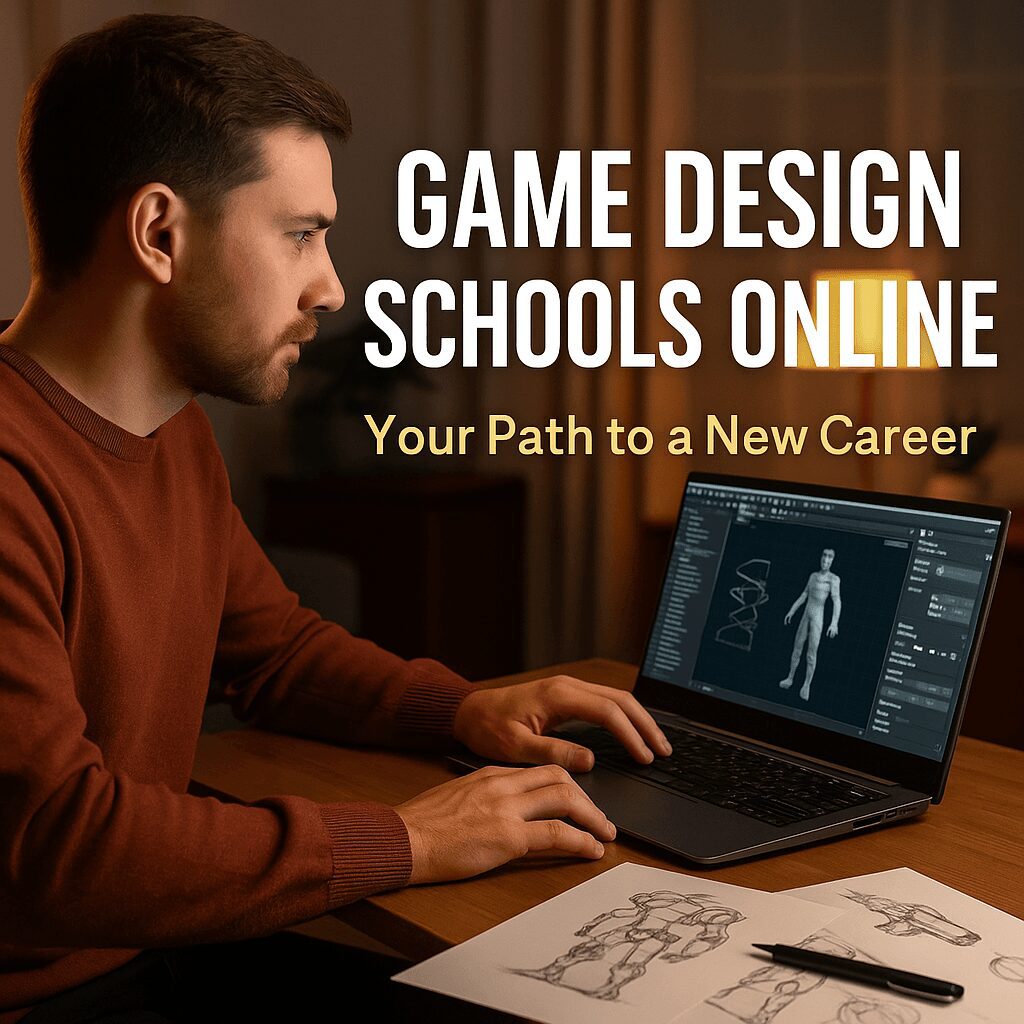If you’ve ever daydreamed about creating your own video game while sitting at your desk job, you’re not alone. More adults than ever are rethinking their career paths and choosing to pivot into the fast-growing gaming industry. But quitting a job to go back to school full-time isn’t realistic for most people — which is why game design schools online have become the go-to solution for career changers.

In this guide, we’ll walk through why online game design programs are an excellent choice for adults, what to look for when picking the right one, and a breakdown of some of the best online schools for game design today. By the end, you’ll know which option fits your goals, lifestyle, and budget — and how to take your first step into the world of game design.
Why Choose an Online Game Design School as a Career Changer?
Switching careers as an adult is never a small decision. It requires balancing your current commitments while investing in skills that can actually land you a job. Here’s why online game design schools are particularly suited for mid-career professionals:
- Flexibility for Working Adults
Most online programs allow you to learn at your own pace, whether part-time in evenings or full-time if you’re ready to transition quickly. - Lower Cost Compared to Traditional Degrees
Tuition for online programs is often more affordable than relocating for a campus degree — plus you save on housing and commuting costs. - Industry-Relevant Skills Without Starting From Scratch
Many online schools offer certificate programs or accelerated bachelor’s degrees focused only on the core design and development skills, letting you skip unnecessary coursework. - Direct Career Pathways
Several schools include portfolio-building projects, mentorship, and even connections with studios that recruit directly from their programs.
What to Look for in Online Game Design Schools
Not all online programs are created equal. For adults making a career switch, the wrong program can waste valuable time and money. Here’s what to consider before applying:
- Accreditation and Credibility
Make sure the program is recognized — employers do notice the difference. Accredited schools carry more weight on a résumé. - Flexible Schedules
Look for asynchronous classes (where you can log in anytime) if you’re balancing work or family. Some programs also offer live workshops for real-time interaction. - Career Support and Job Placement
The best online schools don’t just teach skills — they help you land your first job. Services like portfolio reviews, mock interviews, and recruiter connections are invaluable. - Tuition, Scholarships, and ROI
Compare tuition carefully. Some certificate programs cost only a few thousand dollars, while full bachelor’s degrees can exceed $50k. Make sure the cost matches your career goals.
Top Online Game Design Schools for Career Switchers
Here’s a look at some of the most reputable and career-focused online game design schools that adults should consider.
Win Money Real Cash App Download – Best Legit Apps to Try in 2025
1. Full Sail University (Online Game Design Bachelor’s & Master’s)
- Program Highlights: Full Sail is one of the most recognized names in game design education. Their programs cover everything from storytelling to advanced game mechanics.
- Duration & Flexibility: Accelerated bachelor’s can be finished in about 29 months.
- Cost: Around $650 per credit hour.
- Career Outcomes: Graduates have worked at companies like EA, Blizzard, and Ubisoft.
2. Southern New Hampshire University (SNHU) – Online Game Art & Design
- Program Highlights: Offers a strong blend of art and technology with emphasis on game environments and character design.
- Duration & Flexibility: Asynchronous courses designed for working adults.
- Cost: About $320 per credit hour.
- Career Outcomes: Entry-level roles in 3D modeling, level design, and animation.
3. Academy of Art University (Online Game Development)
- Program Highlights: A highly creative program that combines art, design, and technical skills. Portfolio-driven curriculum.
- Duration & Flexibility: Flexible online format with live interaction opportunities.
- Cost: Around $1,000 per unit.
- Career Outcomes: Graduates build strong portfolios geared toward indie development or studio roles.
4. Coursera + University Partnerships (Certificates in Game Design)
- Program Highlights: Short, affordable certificate programs offered in partnership with accredited universities like Michigan State University.
- Duration & Flexibility: 6–12 months part-time.
- Cost: Usually under $1,000 total.
- Career Outcomes: Great for skill-building, though less weight than a degree for formal jobs.
5. DigiPen Institute of Technology (Online Programs)
- Program Highlights: Known for producing industry-ready graduates, DigiPen emphasizes technical programming and engineering-heavy game design.
- Duration & Flexibility: Multi-year degree programs, part-time options available.
- Cost: Higher tuition, averaging $35,000+ per year.
- Career Outcomes: Excellent for breaking into AAA studios and highly technical roles.
6. Udemy & Skillshare (Independent Online Learning)
- Program Highlights: Not accredited, but highly flexible and cheap. Ideal for adults testing the waters before committing.
- Duration & Flexibility: Self-paced, from hours to weeks.
- Cost: Courses start at $20.
- Career Outcomes: Great for building starter portfolios, but not a substitute for a degree if aiming for studio work.
Comparing Online Game Design Schools: Key Takeaways
- Best for Affordability: Coursera certificates or Udemy courses.
- Best for Flexibility: SNHU and Academy of Art University.
- Best for Fast Career Transitions: Full Sail University’s accelerated degree.
- Best for AAA Studio Ambitions: DigiPen Institute of Technology.
How to Make the Switch into Game Design Successfully
Enrolling in the right school is step one. To actually land a job, you’ll need to actively build your profile while studying. Here’s how:
- Build a Portfolio Early
Start showcasing projects — even small indie games or level designs — on GitHub, ArtStation, or itch.io. - Network Within the Industry
Join online forums, Discord communities, and LinkedIn groups for aspiring and professional game designers. - Seek Internships or Freelance Work
Even small freelance gigs can lead to professional experience that employers value. - Stay Updated on Tools & Trends
Learn engines like Unity and Unreal Engine. Employers expect familiarity with the latest tools.
Conclusion
Switching careers into game design as an adult may feel daunting, but the rise of game design schools online has made it more accessible than ever. Whether you’re seeking a full degree, a certificate, or short-term skills training, there’s an option that fits your lifestyle and budget.
Crypto Com Play Store: How to Safely Download the Official App
The gaming industry is booming — and it’s never too late to start building the skills that can take you from player to creator. Explore the programs above, commit to building a portfolio, and take your first step into a rewarding new career in game design.
FAQs
Is a game design degree worth it for adults switching careers?
Yes — especially if you want to work for established studios. Accredited degrees signal commitment and provide structured learning. However, for indie developers, certificates and self-study can sometimes be enough.
How long does it take to complete an online game design program?
Certificate programs can take 6–12 months, while bachelor’s degrees usually take 2–4 years depending on your pace. Accelerated online options can shorten the timeline.
Can I get a job in game design without a degree?
It’s possible. Many indie developers and freelancers succeed through strong portfolios. However, larger studios tend to prefer applicants with formal education.
What skills do employers look for in game designers?
Employers value proficiency in Unity/Unreal Engine, 3D modeling, coding basics (C#, C++), and creative storytelling. Collaboration and problem-solving are equally critical.




Pingback: best gaming emulators